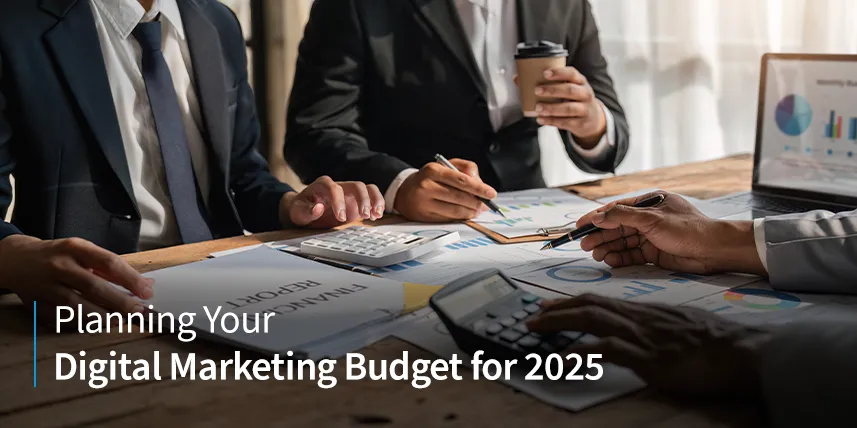As the digital marketing landscape continues to evolve, having a well-structured budget is essential to maximize your return on investment (ROI) and stay competitive. Whether you’re a small business or a growing enterprise, planning your digital marketing budget for 2025 requires careful consideration of various factors, from understanding your goals to allocating resources across different channels. In this guide, we’ll walk you through the key factors to consider when planning your budget, how to allocate funds efficiently, and set the stage for a successful year in digital marketing.
Factors to Consider When Planning a Digital Marketing Budget
Before determining how much to allocate to digital marketing, it’s important to assess your overall business goals and identify the role digital marketing will play in achieving them. Here are some key factors to consider:
- Business Goals: Are you focused on building brand awareness, generating leads, or driving direct sales? Your goals will dictate how much you should invest in different digital marketing strategies. For example, if you’re prioritizing lead generation, you may want to allocate more of your budget to paid ads or email marketing.
- Historical Performance: Look at the past performance of your digital marketing efforts. What channels have delivered the best results? Analyzing past data can help you make informed decisions about where to allocate budget and which strategies to expand or reduce.
- Target Audience: Understanding your audience’s preferences is crucial in deciding which platforms to focus on. If your audience is highly active on social media, it makes sense to invest more in social media advertising and engagement.
- Competitive Landscape: Assess what your competitors are doing. If competitors are heavily investing in SEO or paid search, you may need to consider allocating more resources to those channels to remain competitive.
- Current Resources: Consider your in-house capabilities. Do you have the resources to handle content creation, SEO, and social media management, or will you need to hire external help? Outsourcing may require a larger portion of your budget.
Allocating Budget Across Different Channels
Once you have a clear understanding of your goals and the factors that influence your digital marketing strategy, the next step is to allocate your budget across various channels. A well-balanced approach helps ensure that you’re covering all essential aspects of digital marketing without over-investing in one area. Here’s how you can break it down:
- Paid Advertising (PPC): Channels like Google Ads, Facebook Ads, and LinkedIn Ads can offer quick results and high visibility. These platforms often require a significant portion of the budget, especially if you’re running multiple campaigns. A good starting point for paid ads is 25-30% of your total budget, depending on your business goals.
- Search Engine Optimization (SEO): SEO is a long-term investment but can provide excellent ROI by increasing organic traffic. You’ll want to allocate around 15-20% of your budget here, especially if you’re competing in a crowded market. Consider investing in quality content, backlinks, and technical optimizations.
- Social Media Marketing: Social media channels allow for both organic engagement and paid ads. Depending on your audience’s presence on these platforms, allocate 15-20% of your budget to building and maintaining a strong social media presence, including community management, content creation, and paid ads.
- Email Marketing: Email remains one of the most cost-effective channels for nurturing leads and driving conversions. It typically requires a smaller portion of the budget (around 10-15%), but it’s crucial for maintaining customer relationships and delivering targeted campaigns.
- Content Marketing: High-quality content is key to SEO, social media, and lead generation. Allocate about 15% of your budget to creating blog posts, videos, infographics, and other forms of content that resonate with your audience.
ROI Expectations from Various Digital Marketing Investments
Understanding the return on investment (ROI) of different digital marketing channels is essential for making informed budget decisions. While some channels provide immediate results, others require a longer-term approach but can yield higher returns over time. Here’s what you can expect from various digital marketing investments:
- PPC (Pay-Per-Click) Advertising: PPC campaigns on platforms like Google Ads and Facebook Ads typically offer quick results, especially for lead generation and direct sales. However, they require continuous investment, as the traffic stops once you stop spending. ROI from PPC can be immediate, but it’s crucial to monitor and optimize campaigns to avoid overspending.
- SEO (Search Engine Optimization): SEO is a long-term investment that may take months to show significant results. However, the ROI can be substantial as organic search traffic is free once you start ranking well. Investing in SEO can lead to sustained visibility and traffic growth over time, making it a highly cost-effective channel.
- Social Media Marketing: Social media marketing can drive both engagement and brand awareness. While organic social media efforts may take longer to show a return, paid social ads can provide quicker results. ROI from social media often depends on the quality of content and the engagement it generates from your target audience.
- Email Marketing: Email marketing is one of the highest-ROI channels, with a potential return of $42 for every dollar spent. Nurturing leads through targeted email campaigns can drive conversions and foster customer loyalty, making it a cost-effective long-term investment.
- Content Marketing: High-quality content supports multiple channels, including SEO, social media, and email marketing. While the ROI from content marketing may take longer to realize, consistent efforts lead to greater brand authority, increased organic traffic, and improved lead generation over time.
Tips for Budget Optimization
Maximizing the effectiveness of your digital marketing budget is all about working smarter, not harder. Here are some tips to optimize your spending and get the most value out of your marketing efforts:
- Focus on High-Performing Channels: Analyze your previous campaigns to identify which channels provide the highest ROI. Focus more of your budget on these high-performing channels while scaling back on underperforming areas.
- Repurpose Content: Make your content work harder by repurposing it across multiple platforms. A single blog post can be turned into a social media post, an email newsletter, and a video, maximizing your content marketing investment.
- Use A/B Testing: Continuously test different versions of your ads, email campaigns, and landing pages to see which perform better. A/B testing allows you to optimize your budget by focusing on what resonates most with your audience.
- Leverage Automation: Use marketing automation tools to streamline repetitive tasks like email marketing and social media posting. Automation helps save time and ensures consistency, allowing you to focus your resources on more strategic efforts.
- Negotiate Rates with Vendors: If you work with agencies or vendors, don’t be afraid to negotiate rates. Long-term partnerships or bundling services may result in discounts, giving you more flexibility in your budget.
Tools for Budget Tracking and Reporting
To ensure that your digital marketing budget is being used effectively, it’s crucial to track spending and measure results regularly. Here are some tools that can help you stay on top of your budget and ensure you’re getting the best ROI:
- Google Analytics: Google Analytics is a free tool that allows you to track website traffic, user behavior, and conversion rates. It provides insights into how well your marketing campaigns are performing, helping you identify areas for improvement.
- Google Ads and Facebook Ads Manager: Both platforms offer detailed reporting on ad performance, allowing you to track spending, click-through rates, and conversions. Regularly review these reports to optimize your PPC campaigns.
- HubSpot or Mailchimp: These marketing automation platforms offer robust analytics and reporting features for email campaigns, lead generation, and customer interactions. Use them to track engagement, monitor your marketing funnels, and measure ROI.
- Excel or Google Sheets: Sometimes, a simple spreadsheet can help you track your budget and spending. Create a tracking sheet to monitor your monthly digital marketing expenses and compare them to your goals and KPIs.
- SEMrush or Moz: For SEO tracking, tools like SEMrush and Moz offer insights into keyword rankings, backlinks, and traffic growth. These tools help ensure your SEO efforts are paying off and can guide future investments in content and optimization.
Maximize Your Digital Marketing Budget for 2025
Planning your digital marketing budget for 2025 requires a strategic approach to balance your business goals with your available resources. By understanding the ROI of different channels, optimizing your budget allocation, and using the right tools to track your efforts, you can make sure your investments are working effectively. Whether you’re focusing on paid advertising, SEO, or content marketing, it’s important to stay flexible and adjust based on performance throughout the year.
Make sure your digital marketing efforts are aligned with your business objectives and always track your results to keep improving over time. If you’re ready to refresh your website or explore new opportunities to enhance your online presence, contact us today for expert guidance and support.







